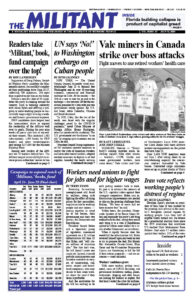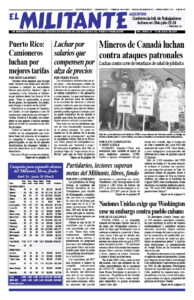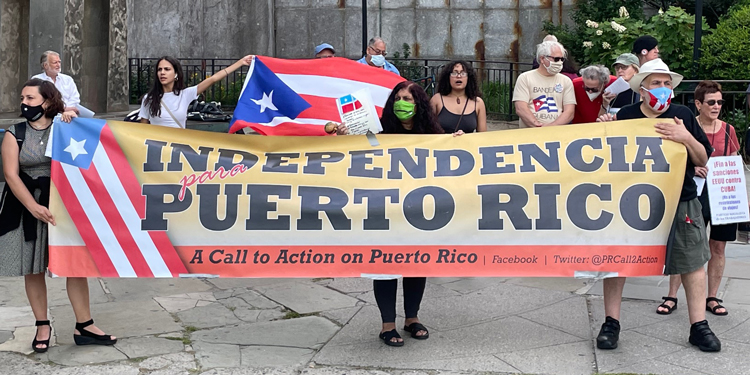UNITED NATIONS — Nearly 20 speakers from organizations in Puerto Rico and the U.S. testified at a June 18 U.N. decolonization committee hearing, speaking out on the devastating consequences of U.S. colonial rule for the Puerto Rican people.
The committee adopted a resolution, introduced by Cuba’s revolutionary government, supporting “the inalienable right of the people of Puerto Rico to self-determination and independence.” Puerto Rico has been a colony of Washington since U.S. troops invaded the island in 1898. Working people there serve as an important source of superexploited labor for U.S. pharmaceutical and other bosses.
Puerto Ricans face catastrophic effects of “more than 15 years of economic depression,” said Juan Dalmau, general secretary of the Puerto Rican Independence Party. On top of that, he said, is “an unpayable debt” of $74 billion.
Speaker after speaker described the sharp cuts in living standards dictated by the Financial Oversight and Management Board — known in Puerto Rico as the junta. It was imposed by the Barack Obama administration and U.S. Congress in 2016 to ensure debt payments to the wealthy bondholders.
Trilce Torres of the Gran Oriente Nacional, a longtime pro-independence Masonic lodge, reported that “the junta has ordered increases in water and electrical utility rates and highway tolls; cuts of up to 10 percent in retirement pensions; slashing our public university’s budget to less than half of what it was.”
Others pointed to the failure of the U.S. and colonial governments to rebuild basic infrastructure since Hurricane María devastated the island in 2017, cutting off electrical power for nearly a year. Periodic blackouts continue today.
“Puerto Rico was particularly hard hit by the pandemic,” noted Gabriela Malespín of New York Boricua Resistance. And with the recent blackouts, hospitals “continue to go in and out of power even with back-up generators, ruining needed hospital equipment. Access to doctors, hospitals and critical health care on the island remains dire.”
Malespín called for abolishing the U.S.-imposed junta and canceling Puerto Rico’s debt. She said Puerto Rico needs a government “that prioritizes the needs of the working class.”
Myrna Pagán, a resident of the Puerto Rican island of Vieques, denounced the lack of medical facilities there since its one hospital was destroyed in the hurricane. Today, she said, there is only “an improvised facility in a storm shelter” and inadequate transportation to get emergency cases to the main island.
The colonial rulers’ response to the pandemic has magnified the social crisis in many ways — from high joblessness to a yearlong nightly curfew that was only lifted last month. As part of the government-imposed lockdowns, schools from preschool to university “have remained closed for the last 15 months,” reported Estelí Capote of the Socialist Front. In addition, she said, 43% of the island’s schools have been shut down over the past 10 years.
Edwin Ortiz, from Call to Action on Puerto Rico, and other speakers denounced the recent handing over of the public electric utility to a private U.S.-Canadian company, Luma Energy. They noted that this has already dealt blows to the UTIER electrical workers union and will hike electric rates.
‘Cancel the debt!’
Martín Koppel, speaking for the Socialist Workers Party in the U.S., underscored the fact that “working people in Puerto Rico are not helpless victims — they are responding.” He pointed to the island-wide protests against the privatization of the electrical authority, a recent successful strike by dairy plant workers and ongoing protests by independent truckers. He joined the call to demand Washington cancel Puerto Rico’s debt.
Koppel added that “a successful fight for Puerto Rico’s independence from Washington’s rule will also strengthen working people in the U.S. We face a common enemy — the U.S. ruling capitalist class, their government and their parties, Democrats and Republicans alike.”
“We can’t make the mistake of believing that the election of a Democratic president in the U.S. will advance decolonization in Puerto Rico,” said Manuel Rivera of Puerto Ricans United in Action. “Democrats and Republicans alike have treated Puerto Rico the same way — like a private plantation.”
Several speakers rejected the so-called Puerto Rico Self-Determination Act, a bill sponsored by Democrats Nydia Velázquez and Alexandria Ocasio-Cortez, as a fraud. It “gives the U.S. government the power to approve or disapprove of our choices” on Puerto Rico’s status, said Ben Ramos of the ProLibertad Freedom Campaign. It “proves our colonial domination.”
At the end of the hearing, Cuban Ambassador Pedro Luis Pedroso introduced the resolution in support of Puerto Rico’s right to independence, which the U.N. decolonization committee adopted. Pedroso affirmed the Cuban revolutionary government’s longstanding solidarity with the struggles by Puerto Ricans.
Later that day, participants from the hearing joined a rally called by ProLibertad under the theme “Solidarity with Puerto Rico and Cuba: Two Wings of One Bird.” Some also attended a “dinner-dialogue” in the Bronx sponsored by the Frente Independentista Boricua (Puerto Rican Pro-Independence Front).


